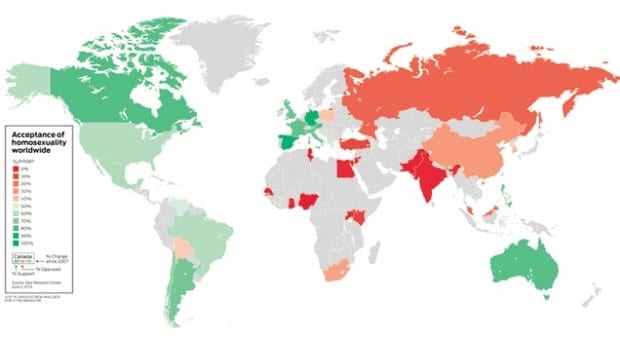Plus ça change.
For every two steps forward for gay rights worldwide, there appears to be one step back. For every new Pride parade like the one in Riga, Latvia, there is a brutal attack in an otherwise safe space, such as Brooklyn. For every gay marriage bill that passes in a place like Iowa, a regressive anti-gay “propaganda” law is introduced in Russia. Every time a transgender rights bill is passed, such as Toby’s Act here in Ontario, a bill like the draconian “kill the gays” bill in Uganda inches forward.
That seems to be the reality of gay rights worldwide, according to a new Pew Research poll. While the past year has marked landmark steps forward for gay rights, things aren’t moving as fast as they seem.
The poll reflects that, in much of the West, gay rights are calcifying. In Canada, not even a decade after a heated debate over the passing of gay marriage, fully 80 percent of the country answered yes when asked, “Should homosexuality be accepted?” Only 14 percent said no.
That puts us behind only Germany and Spain as the most vocally supportive of gay rights. Almost all the European nations polled found roughly the same level of support — more than 75 percent — with the exceptions of Greece, Poland and Russia.
But almost all the great leaps forward for acceptance were in the West. Those countries that, according to a similar poll done in 2007, were already supportive simply became more supportive.
South Korea made the largest jump, with a 21-percent uptick, but a majority of the country is still unsupportive. The United States, a country that still has anti-gay laws on its books, surged 11 percent — a majority, 60 percent, now support gay rights. Canada, too, progressed by a similar amount.
Apart from that, nations had single-digit shifts. While some countries, like Kenya, showed marginally positive trends, support shifted in favour of gay rights by only about three percent over six years. Around the same number, in many other countries, became less supportive.
France, where a recently passed law legalizing gay marriage has sparked massive protests, took the largest step back, going from the most supportive country, at 83 percent, in 2007 to a still-admirable 77 percent.
Countries like Palestine, Russia and Turkey have all seen their already anti-gay attitudes slide even further.
The outlook isn’t improving: 13 of the 39 countries polled hold single-digit support for acceptance. Just 17 have majority acceptance. And this is only on the primordial question of whether the basic reality of gays and lesbians should be accepted — never mind the further questions of human rights protections, freedom of expression, marriage and adoption.
One promising region is Latin America. Only Bolivia and El Salvador fell below 50 percent support, with countries like Argentina and Chile surpassing more than two-thirds support.
The world map paints a discouraging picture for a campaign that appears stalled at the starting gates.
Canada and Great Britain have made gay rights a hallmark at meetings of the Commonwealth of Nations, yet their efforts appear to be making little headway. Most of the Commonwealth countries polled — Ghana, Uganda, South Africa and Malaysia — held predominantly anti-gay views. Only Australia, England and Canada are even marginally supportive of gay rights.
The UN, too, has pushed an LGBT rights declaration, encouraging its member states to adopt a set of principles outlining their support for gay rights. Roughly half the represented countries have signed on, almost entirely in the Americas and Europe, while more than 50 states — mostly in Africa, the Middle East and South Asia — have signed a contrarian declaration underlining their opposition to gay rights.
The statistics come amidst several months of high-profile anti-gay attacks, from the United States to Russia. While many countries have moved forward on laws to improve the legal status of gay people, others, like Uganda, have pushed draconian measures that seek to further criminalize, even put to death, homosexuals.
Some of the attacks have happened at home, with Canadian police reporting more than 100 violent hate crimes motivated by sexual orientation each year, a statistic that has climbed in recent years.
In its annual state-based homophobia report, the International Lesbian, Gay, Bisexual, Trans and Intersex Association (ILGA) last year noted that progress is happening in fits and starts. Renato Sabbadini, co-secretary general of the ILGA, called the global trend “positive” but added the caveat that “the pace of change is not as quick as many of us in the LGBT movement would like.”
Sabbadini says it’s not surprising that countries with long histories of supporting gay rights are now moving toward marriage equality and anti-discrimination laws: “2012 and 2013 will indeed be remembered as the years in which several countries adopted same-sex marriage laws or laws recognizing identity rights to transgender people.”
But he says that there are problem zones, like Russia, which he accuses of bending to the will of the Orthodox Church. The broader impact, Sabbadini says, could be to influence other nearby states like Ukraine to imitate the state-based homophobia.
In general, Sabbadini is optimistic. “We believe this to be only a temporary setback,” he says. “As more and more LGBTI people become visible and vocal, very often at a high price for LGBTI activists and human rights defenders in many countries, the issue of equality is gradually transforming itself in the eyes of the population from an abstract issue to a very concrete one.
“When enough people in the population see things in concrete rather than abstract terms, then the tipping point has been passed and the progress towards more equality becomes unstoppable,” he says.


 Why you can trust Xtra
Why you can trust Xtra


